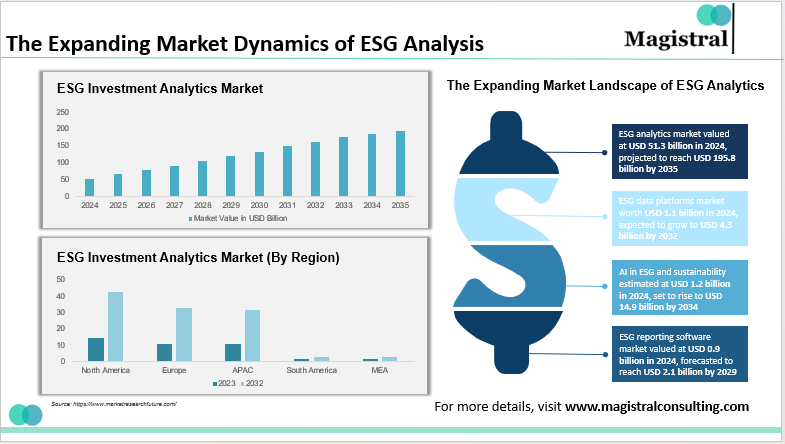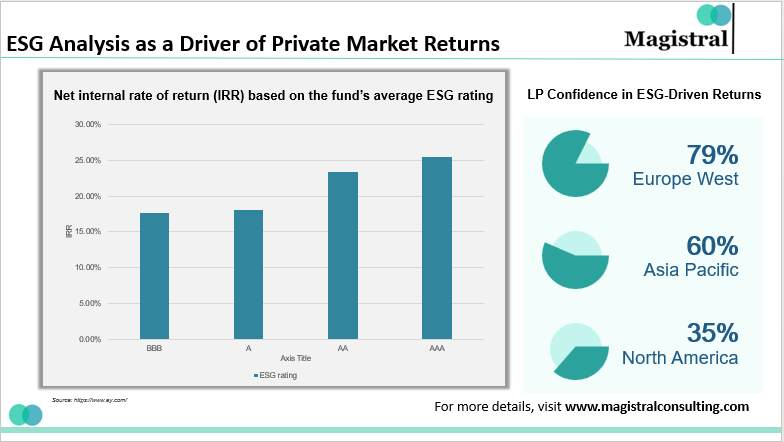In the past few years, ESG issues have moved from being an ethical necessity to a material priority. Investors are no longer perceiving ESG as some sort of Platonic ideal- they see it as a quantifiable driver of long-term value creation. However, the old industry’s reliance on ESG ratings is starting to crack. Ratings typically do not accurately capture the actual behavior of corporations in real-time or the materiality of their financials, providing investors with an incomplete picture of opportunity and risk in sustainability. With evolving markets, the dialogue is shifting quicker than ever from scores to signals, and from ratings to outcomes. Sophisticated ESG analytics, fueled by data, technology, and contextual intelligence, are redefining how portfolio strategies are crafted, tracked, and implemented.

The Expanding Market Dynamics of ESG Analysis
How Analytics-Driven ESG Is Rewriting the Rules of Investment Insight
The ESG relationship of the financial industry has evolved from a compliance exercise to an analytics-heavy discipline that informs portfolio construction and benchmarking. No longer a qualitative overlay, it is today an analytical engine driving investment strategy. The change is evident: no longer is ESG analyzed in a stand-alone manner. It’s quantified, modeled, and translated into analytics frameworks that uncover material financial signals well ahead of markets pricing them in.
This transformation is being spearheaded by the coming together of three structural drivers of contemporary investment analysis. It is data abundance, algorithmic processing, and investor accountability.
From Aggregated Scores to Granular Signals
The traditional third-party ESG ratings are giving way to multi-layered data ecosystems that bridge hundreds of indicators. It includes supply-chain emissions, executive compensation alignment, social impact, governance integrity, and more. Investors are creating proprietary ESG signal libraries, which are tuned to identify company-specific behaviors. Those are often missed by traditional ratings.
From Descriptive Metrics to Predictive Models
Sophisticated ESG analytics leverage machine learning, sentiment analysis, and probabilistic forecasting to look at not what a company is, but where it’s going. Predictive ESG modeling can, for example, forecast how a company’s transition-readiness or board diversity trend might drive valuation multiples in the next three years. This forward-looking view through analytics turns ESG into a dynamic investment signal from a static report.
From Reputation Management to Risk-Adjusted Returns
Institutional investors are no longer chasing ESG for appearances- they’re chasing it for alpha. Empirical research increasingly indicates that firms with bettering ESG metrics have lower volatility. It also increased credit quality, and superior long-term performance. By integrating ESG analytics into factor models, portfolio managers can increase diversification without diminishing returns and mitigate drawdowns during bad times in markets.
More than 70% of global asset managers, as per BlackRock’s 2025 Sustainable Investing Report. They now connect ESG analytics directly with performance attribution frameworks, a five-year increase from only 28%. This speaks to a pivotal change: ESG information is now financial information.
For hedge funds, it entails embedding sustainability indicators in trading models. For private equity, it entails applying ESG analysis as part of operational due diligence to estimate value-creation levers such as energy efficiency or corporate governance improvement. And for institutional asset managers, it entails transforming portfolio construction to seize “ESG momentum alpha,” the performance premium of companies that are enhancing more rapidly than their peers on sustainability dimensions.
Analytics-based ESG, thus, is not just a new set of data- it’s a new investment model. It enables financial institutions to predict risk, simulate resilience, and make profitability and purpose converge, with data as the shared language.
How ESG Analytics Translate into Portfolio Alpha
In the investment world today, ESG analytics are not merely reputation-management tools, they are financial-discovery tools. The discussion has turned from “does ESG create value” to “how ESG intelligence can drive alpha systematically.” The answer is to use ESG data to create forward-looking financial signals that guide risk, return, and valuation across portfolios.
Materiality Mapping: Discovering What Really Moves the Needle
Not all ESG factors are equal. The analytical advantage lies in identifying financially material ESG indicators, those statistically related to performance within particular sectors. For example, carbon intensity is material in energy and manufacturing sectors, but supply-chain ethics may be more relevant for consumer products. Sophisticated ESG models combine this sector-specific materiality mapping into factor analysis, with sustainability variables weighted by their relative influence on cash flows, cost of capital, and market multiples.
This enables investors to shift from generic ESG ratings to performance-relevant ESG insights that converge with financial fundamentals, connecting the dots between sustainability data and investment returns.
ESG Momentum: Identifying Future Outperformers
Static ESG scores offer a point-in-time snapshot, but ESG momentum, the velocity at which a company’s ESG is getting better, has been a significantly stronger predictor of alpha. Companies showing steady improvement in their sustainability metrics tend to see their valuations re-rate and enjoy greater investor confidence.
Portfolios that overweighted firms with positive ESG momentum outperformed their benchmarks by 1.8–2.3% per year over a five-year period, as per a 2024 MSCI study. ESG analytics measure this trajectory of improvement through longitudinal datasets, sentiment analysis, and real-time disclosures, enabling portfolio managers to spot tomorrow’s winners before the market sees them.
Risk Compression Through ESG Intelligence
One of the most underappreciated alpha sources is protection on the downside. ESG analytics add to portfolio robustness through the detection of non-financial risk, regulatory fines, supply chain exposure, and reputation shocks prior to their actualization into monetary losses.
By incorporating ESG factors into Value-at-Risk (VaR) and credit spread models, fund managers can more effectively anticipate clusters of volatility due to sustainability issues or governance failure. Institutional investors, in turn, experience reduced tail risk and increased Sharpe ratios. It is especially during market declines when weakly governed companies suffer precipitous drawdowns.
Guiding Factor-Based and Quant Strategies
Quant funds and multi-factor approaches increasingly use ESG data as a novel alpha factor. It is a source of market inefficiency that may be systematically capitalized on. ESG analytics are directly input into machine-learning algorithms that identify non-linear relationships among sustainability metrics and excess returns.
For instance, combining carbon-transition readiness scores with pricing momentum and quality factors has been found. It is to enhance model performance in selecting outperforming stocks in transition-sensitive industries such as energy and materials. With increasing ESG data coverage and quality, quantamental ESG investing- combining quantitative and fundamental understanding poised to become the next institutional alpha-generating frontier.
Private Markets: ESG as a Value-Creation Lever
In venture capital and private equity, ESG analytics have become central to value creation in operations. Instead of evaluating ESG after investment, companies are incorporating analytics in due diligence, portfolio tracking, and exit planning.
ESG insights based on data spot inefficiencies: like excessive energy usage or poor governance frameworks. When addressed, they release operational cost savings and enhance EBITDA. In Bain & Company’s 2025 Private Equity ESG Report, 70% of GPs now measure ESG gains as part of a value-creation strategy. It is further integration of sustainability and performance.

ESG Analysis as a Driver of Private Market Returns
By integrating ESG analytics into the investment lifecycle- ranging from screening to portfolio optimization, fund managers are not only fulfilling sustainability requirements; they are creating alpha through data-driven insight. ESG analytics reframe sustainability as a financial strategy rather than a moral imperative- one that is quantifiable, predictive, and performance-based. With more investors embracing sophisticated ESG modeling, competitive advantage will come to rely increasingly on the ability of companies to effectively leverage alternative data, machine learning, and contextual intelligence within their investment systems. Those with the capacity to unscramble ESG nuance into actionable investment signals will create the next generation of outperforming portfolios.
Magistral’s ESG Services
Magistral helps investment firms turn ESG insights into a strategic edge. By combining deep research expertise with data-driven analytics, we enable asset managers, private equity funds, and hedge funds. It is to integrate sustainability principles into every stage of the investment lifecycle- enhancing transparency, performance, and long-term value creation.
Our ESG offerings include:
ESG Research & Analytics
Comprehensive assessments covering portfolio screening, risk benchmarking, and materiality mapping.
Integration Support
Embedding ESG factors into deal evaluation, due diligence, and ongoing portfolio monitoring.
AI-Driven Insights
Leveraging data models to quantify ESG performance aligned with frameworks like SFDR and CSRD.
Sustainability Reporting
Assistance with ESG disclosures, investor reporting, and compliance documentation.
Operational Efficiency
Offshore research support that enhances analytical depth while reducing execution costs.
About Magistral Consulting
Magistral Consulting has helped multiple funds and companies in outsourcing operations activities. It has service offerings for Private Equity, Venture Capital, Family Offices, Investment Banks, Asset Managers, Hedge Funds, Financial Consultants, Real Estate, REITs, RE funds, Corporates, and Portfolio companies. Its functional expertise is around Deal origination, Deal Execution, Due Diligence, Financial Modelling, Portfolio Management, and Equity Research
For setting up an appointment with a Magistral representative visit www.magistralconsulting.com/contact
About the Author

Dhanita is a BD and Marketing professional with 6+ years’ experience in sales strategy, growth execution, and client acquisition; credentials include Stanford Seed (Stanford GSB), an MBA from USMS–GGSIPU, and a B.Com (Hons) from the University of Delhi. Expertise spans market research and opportunity mapping, sales strategy, CRM, brand positioning, integrated campaigns, content development, lead generation, and analytics; currently oversees business development calls and end-to-end marketing operations
FAQs
What core services does Magistral offer?
Does Magistral provide ESG due diligence for private market investments?
How does Magistral ensure data confidentiality and compliance?
How does Magistral assist firms in ESG performance tracking and reporting?